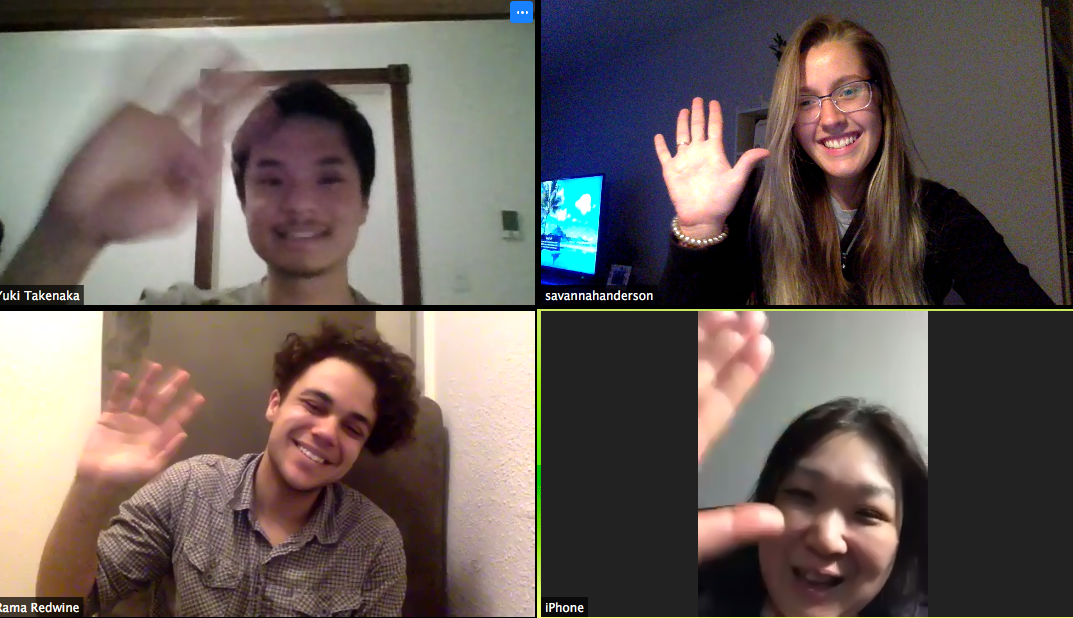Maintaining Connections from All Corners of the World

When international students return home after a semester or years at Chico State, for many, the most treasured souvenirs are new friendships, classroom conversations, and connections with people from different backgrounds.
As the COVID-19 pandemic shifted Chico State’s campus operations and resources to a virtual format, many wondered if this in-person culture of connection and communication would—or could—continue in a world of physical isolation.
Those who work the closest with the University’s 326 international exchange students, who either remained stateside or traveled back to their home countries, saw a problem that needed to be fixed. Their answer: The International Wildcat Global Café.
A partnership between ESL Support Services and the Office of International Education and Global Engagement (IEGE), students, tutors, and international student advisors meet via Zoom every Friday when it’s evening in Chico and morning halfway around the world. They check in, chat about life and, of course, talk about how COVID-19 continues to impact their lives and what the future may hold.
The Global Café fills a need for group interaction and serves as a virtual educational support system, said student advisor Cindy McKay. With the global pandemic separating both students who remained in the states and those divided by oceans and country borders, staying engaged with each other is more important than ever.
“The Global Café started out with a bang, with 22 students in attendance,” McKay said. “It sounds small, but relative to participation we normally get for workshops and events, this is actually a great turnout.”
The virtual meetup mirrors existing weekly meetings at ESL Support Services, called Conversation Hour, where international students interact with English as a second language (ESL) tutors and each other in fun conversations, games, and vocabulary exercises. The tutors who interact with ESL students are trained on the best ways to communicate to those who may still be sharpening their English language skills, and a few are English learners themselves.
Each week the group engages in a new themed conversation—such as traditional foods around the world, slang words, or holidays and celebrations.

“[The tutors] have been missing their daily interactions with students,” McKay said. “They do a great job and are very engaging.”
But these meetings are more than grammar discussions and language exercises. They are also about keeping the Wildcat community tight-knit from all corners of the world.
On a recent meetup, the topic was travel—where have you been, where do you want to go, and what languages do you want to learn.
Agriculture major Yuki Takenaka, a Japanese exchange student, talked about how he wished to travel to Mexico. His goal is to help uplift developing areas—such as Cambodia, Thailand, Taiwan, areas in Mexico, and others—by implementing new technological advancements in agriculture. Though at times it can be difficult, Takenaka decided to remain in Chico for the remainder of this international exchange program, regardless of the pandemic.
“I chose Chico State because of the agriculture program, and I want to learn everything I can,” said Yuki. “The lockdown can be hard for plant science classes, but it is a good opportunity for me to focus on gathering knowledge.”
Though it was a small group that logged in that evening, it was full of genuine curiosity about each other. Many of these Wildcats had never met, yet they were welcoming and eager to get to know each other more. They discussed how the coronavirus has impacted where each was living, how University life might change in the coming months, and how their plans for the future travel and life goals might change. The conversation was rooted in anxiety and uncertainty, yet the group was reassuring and supportive of each other’s concerns.
Such interactions, McKay said, have been typical. She recalled a recent meeting in which one of their most faithful attendees became tearful while speaking about his homesickness, which was brought on by a conversation with a friend back home and the distance and isolation he was feeling. However, this student was determined to remain in Chico, as he too did not want to regret abandoning an opportunity to study abroad.
“He described how lonely he has been since classes went online because he is living alone,” said McKay. “Conveying his sadness, and also his determination, was so touching to everyone. Attendees gave him tons of support and it was very emotional. It was an intense moment of human connection that I think we all appreciated and needed.”
Those logged in to that week’s Global Café meeting made sure the student felt heard, supported, and anything but isolated. It was a moment of, as McKay described, true human connection.
As Tasha Alexander, another IEGE student advisor, frequently reminds the team, “We are in the business of loving other people’s kids,” McKay said.
“In many respects, especially to new and younger students, Tasha and I are like a hybridized version of a friend and a parent,” she continued. “We provide a trusted constant in a world where everything is new and different. We feel a great sense of responsibility to these young people because many are here, halfway across the world, all by themselves.”
The Office of International Education and Global Engagement is also adapting to the changes of its virtual world, implementing online appointments and virtual advising tools, especially for students in other countries who haven’t yet arrived in Chico and are planning for their Chico Experience. Those could become a regular part of their offerings even when campus returns to normal, Alexander said.
“This crisis has given us an opportunity to think outside the box, and I think we will come up with many new creative ideas using technological tools in the future,” she said.
The International Wildcat Global Café will continue through May 1. As a finale to the first virtual semester, on May 8,the students and tutors are going to hold a virtual International Wildcats Got Talent show.
Those interested in connecting with the International Wildcat Global Café and other international studies services can contact Tasha Alexander at tmalexander@csuchico.edu or Cindy McKay at cjmckay@csuchico.edu.


